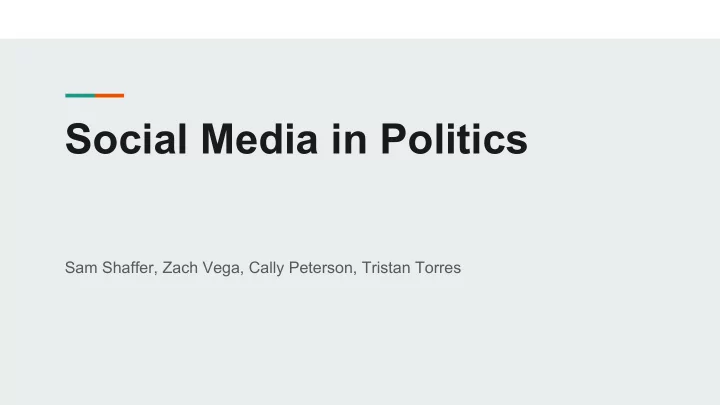

Social Media in Politics Sam Shaffer, Zach Vega, Cally Peterson, Tristan Torres
Types of Social Media ● Facebook ● Twitter ● Snapchat ● Instagram ● Youtube
Facebook Number of Facebook users by age in the U.S. as of January 2018 (in millions) ● 214 Million active users ● Most popular social media platform worldwide (Statista, 2018, pp. 1).
Twitter Number of monthly active Twitter users worldwide from 1st quarter 2010 to 4th quarter 2017 (in millions) ● 280 character count ● Photos, videos, direct messages (Statista, 2017, pp. 1).
Snapchat Number of daily active Snapchat users from 1st quarter 2014 to 4th quarter 2017 (in millions) ● Almost ⅓ of users are aged 18-24 ● 10 billion mobile videos per day (Statista, 2017, pp. 1).
Instagram Number of monthly active Instagram users from January 2013 to September 2017 (in millions) ● Edit/share photos and videos ● Half of user base is between ages 18-29 (Statista, 2017, pp. 1).
Politics Definition: the activities associated with the governance of a country or other area, especially the debate or conflict among individuals or parties having or hoping to achieve power. Current President: Donald Trump
TEDTalk Comments https://www.ted.com/talks/ gretchen_carlson_david_brooks_political_common_g round_in_a_polarized_united_states/discussion ● (31:48) “The prevalence of social media and individualized content” (Carlson, Brooks, Anderson, 2017)
Primary Research - Survey
Survey Cont’d
Primary Research - Interview Interview conducted with Aaron Lattanzi SU Graduate student studying Political Science ● “President Trump definetly uses social media platforms like Twitter to change the discussion in the media… he draws on points Republicans are doing well in rather than addressing negative events” ● “In terms of getting my news everyday, I always go to social media first. It is a great way to not only get an overview of what is going on but also allows for news from multiple sources…” ● “Twitter has become an important way for the President to go public” (Lattanzi, Aaron, personal communication, April 3, 2018).
Marketing on Social Media ● Becoming a much larger part of business’s marketing department ● Millions of people visit social media by the day ● Brands began realizing it is much cheaper ● Differs by platform (Lyfe Marketing, 2018, pp. 1)
Marketing on Social Media ● It is important to know your users ● Also important to know what platform people will actually view your advertisement ● Instagram has highest interactions per post per 1000 followers (thenextweb.com, 2018, pp.1)
Marketing on Social Media ● Knowing how viewers will respond helps ● Finding a niche ● Pit Viper ● Wendys (spoutsocial.com/index, 2017, pp. 1)
Social Media & Academics Negative Aspects: “Studies suggest that Gen Y actively ● Socioeconomic factor contributes content, creating and ● Is social media too distracting? mashing (i.e. combining of content from ● Consumption vs. Contribution multiple sources); that they gravitate toward social media sites where they Positive Aspects: can participate (Dye, 2007); and that they prefer to stay connected and ● Academic and social integration multitask through technology (Rawlins ● Can encourage discussion & et al., 2008).” ( Bolton, Parasuraman, engagement Hoefnagels, Migchels, Kabadayi, Gruber, Loureiro, & Solnet, 2013). ● Creates audience
Examples of Social Media in Classrooms (The Use of Social Media in School Infographic, 2013).
Social Media and Mental Health Negatives ● Body image/making comparisons (Focusing on likes) ● Sleeping problems (Depression) “...small study of teens ages 13-18 from ● Feeling of being accepted (Cyberbullying) the UCLA Brain Mapping Center found ● Fake friends (Lack of privacy) that receiving a high number of likes on ● Less face time (Social interaction) photos showed increased activity in the reward center of the brain. Further, teens Positives are influenced to like photos, regardless of content, based on high numbers of likes. Bottom line: It feels good to be ● Teens need socialization (Easy/immediate) “liked” and herd mentality is big on ● Teens in marginalized groups find support (Isolation/finding social media. Like what others like and support) you’re in.” (Katie Hurley, 2018, p. 1)
Facebook’s Studies on Mental Health ● Users who read information but not interacting with others reported to feel worse than those who read information on the site and interact with others ● College students chosen to only read Facebook for 10 minutes were in a worse mood at the end of the day than those who read and posted messages or communicated It said such problems may with friends arise because mobile ● Found that individuals who “liked” twice as many posts than phones have redefined average users reported for worse mental health relationships, creating a state of people being “alone together.” (Moira Burke, 2017, pg.2)
Psychology and Social Media ● Personality effects ○ Positively related: Extraversion, openness to new experiences ○ Negatively related: Emotional stability ● Social media influences our perceptions which influences the way we view politics ○ Mere Exposure Effect ○ Dunning Kruger Effect ○ Blind Spot Bias ○ Groupthink ○ Anchoring Effect ○ Authority bias
Cambridge Analytica ● Used personality in order to influence voters ● Used apps to access FaceBook profiles
Why is This Relevant? ● It is directly related to digital literacy ● To understand what is truly going on in the world, it is important to know what you are reading and if it is a credible source
Kahoot https://play.kahoot.it/#/?quizId=0d8adc03-7ac3-47d2-9f12-015cf8c46e0b
Questions?
Citations Ruth N. Bolton, A. Parasuraman, Ankie Hoefnagels, Nanne Migchels, Sertan Kabadayi, Thorsten Gruber, Yuliya Komarova Loureiro, David Solnet, (2013) "Understanding Generation Y and their use of social media: a review and research agenda", Journal of Service Management, Vol. 24 Issue: 3, pp.245-267, Retreved from https://doi.org/10.1108/09564231311326987 Anna, June. (2011, April 26). The effect of social network sites on adolescents' social and academic development: Current theories and controversies. Retrieved from https://doi.org/10.1002/asi.21540 Chen, B., Bryer, T. (January 2012). Investigating Instructional Strategies for Using Social Media in Formal and Informal Learning. Retrieved from http://www.irrodl.org/index.php/irrodl/article/view/1027/2073?utm_campaign=elearningindustry.com&utm_source=/ 10-tips-to-effectively-use-social-media-in-formal-learning&utm_medium=link.
Recommend
More recommend